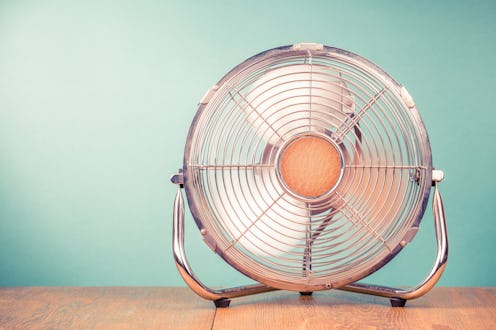Life
Why You Feel Sick After Sleeping With A Fan On At Night

We've officially reached the peak of summer, which means two things: one, we can begin our countdown to autumn (yes, already). Two, it is very, very hot outside almost everywhere. This summer has, so far, brought record high temperatures to most of the world, and that doesn't seem to be stopping any time soon. Dealing with the heat during the day is one thing, but dealing with it at night? That's when things get insufferable. It's difficult, if not impossible, to fall asleep when you're sweating profusely and sticking to your sheets. We can't all afford air conditioners, and sometimes need to make due with a simple ceiling or floor fan to move the air around a bit. Unfortunately, this can have some less than pleasant side effects, leading many to wonder: does sleeping with the fan on make you sick?
The answer is a little bit more complicated than we'd all like it to be, and it isn't the same for everyone. There are certainly benefits to sleeping with the fan on: the white noise can actually help some people sleep better, the temperature can feel a bit cooler, and the circulation of air can keep icky odors away. There are also some important downsides to consider, though, and yes — some of them have to do with getting sick.
According to Sleep Advisor, fans can push around dry air. The site reported, "The constant stream of air also has a tendency to dry out your nasal passages, which could affect your sinuses. If the dryness is particularly extreme, it can result in your body producing excess mucous to try to compensate. Then, you're more susceptible to blockage, stuffiness, and sinus headaches." In other words, it's totally possible that the fan can cause a sinus infection, which isn't exactly a walk in the park.
If you're prone to allergies, sleeping with a fan is probably going to make things worse for you. When the fan is on, it's moving air around the room. It's also moving dust and pollen around as well, allowing them to make their way into your sinuses, potentially bothering people with allergies, asthma, and hay fever.
Basically, it's definitely possible to get sick because you slept with your fan on. However, Dr. Clifford Bassett, New York City allergist and author of the book The New Allergy Solution, told The Independent that it's a pretty minor threat: "For many of us, it doesn’t really appear to pose an issue. If you experience sneezing or worsening nasal symptoms, and you have indoor allergies, due to air forcefully blowing up your nasal passages causing sneezing, which is actually a protective mechanism, it can be annoying and perhaps cause a flare-up in your nasal allergies." Unless you have serious allergies, you'll most likely be okay.
There are some other annoying side effects to leaving a fan on as well, like the fact that the dry air can cause dry skin and even dry eyes, especially if you sleep with contacts on (which you shouldn't be doing regardless).
If you want to be extra careful, make sure you're keeping your room as clean as possible so that the fan can't pick up a lot of dust and allergens. You should also keep the fan itself clean — all of the dust on the blades can get whipped around the room very easily.
Overall, you should feel okay about sleeping with the fan on... especially if it's the only thing keeping you cool all night long.
This article was originally published on